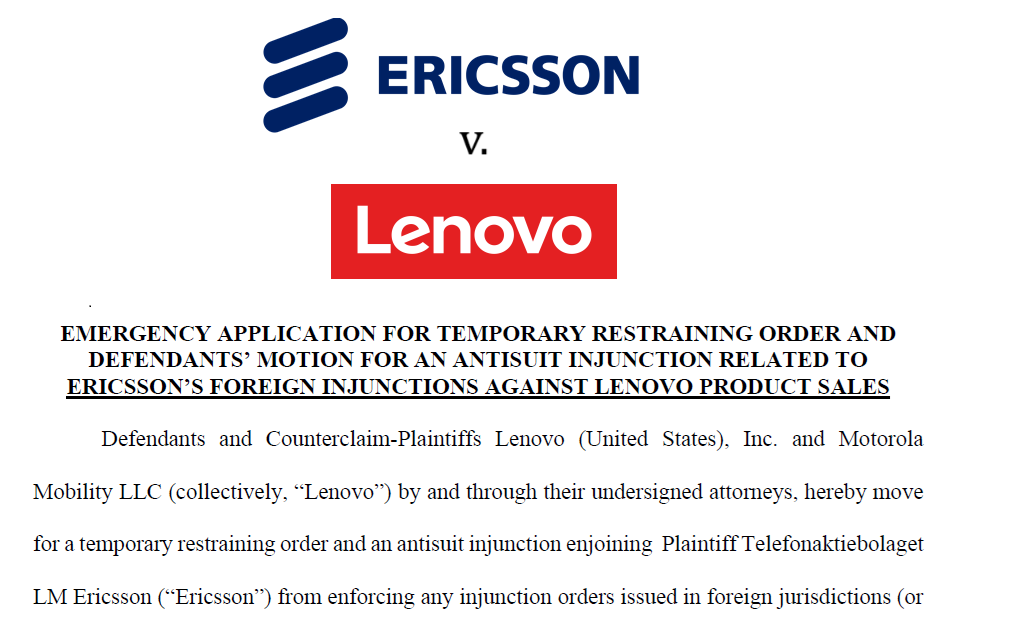Context: Cases relating to the patent licensing dispute between Ericsson and Lenovo (including its Motorola Mobility subsidiary) are known to be pending in multiple jurisdictions. ip fray has previously reported on three preliminary injunctions obtained by Ericsson against Lenovo and its customers in Colombia as well as on a Brazilian preliminary injunction. In the U.S., there are two investigations by the United States International Trade Commission (USITC, ITC) (337-TA-1375 and -1376) and companion lawsuits in the United States District Court for the Eastern District of North Carolina (5:23-cv-569 over standard-essential patents (SEPs) and 5:23-cv-570 over non-SEPs).
What’s new: Yesterday (Friday, December 29, 2023), Lenovo filed a motion for an antisuit injunction (ASI) (initially a temporary restraining order (TRO), to be precise) in the North Carolina FRAND case. Lenovo has found out about more than 30 Colombian actions in which Ericsson is seeking or has already obtained PIs against Lenovo and its customers, and would like the U.S. court to bar Ericsson from seeking, enforcing or continuing to enforce any SEP-based PIs in Brazil, Colombia or elsewhere. The new documents also reveal that there is a dispute over the extent to which a prior license agreement between Ericsson and Motorola Mobility precludes infringement claims at this stage, with Ericsson noting that it was only a 4G agreement. It is furthermore known now that Ericsson offered Lenovo a discounted rate (from its standard $5/per device 5G rate) of 1% of the selling price with a $4 cap, which was a rate that U.S. courts blessed in a dispute with HTC over 4G. Also, Lenovo has asked Justice Meade of the London-based High Court of Justice for some sort of declaratory relief to use against Ericsson in the further Brazilian proceedings.
Direct impact: In order to make a case for irreparable harm, Lenovo explains that the Latin American PIs are hurting as the company has a high market share there and also produces many smartphones in the Brazilian cities of Jaguariúna and Manaus through a contract with Flextronics. Lenovo may hope to be granted overreaching relief in a district that hasn’t previously dealt with a similar injunction request. By the time that this article was written, the court had not yet ruled on the TRO motion, nor had Ericsson responded.
Wider ramifications: What is at stake beyond this particular dispute is international comity as Lenovo is looking for help from courts in the U.S. and (in a novel form) the UK with a view to Latin American proceedings and potentially even cases in other jurisdictions that Lenovo may not be aware of yet. The only U.S. antitrust injunction relating to SEP enforcement to have been upheld on appeal (Microsoft v. Motorola Mobility) involved U.S. negotiations between two U.S. companies and was also far more narrowly-tailored than what Lenovo is seeking. Therefore, Lenovo is trying to stretch the envelope of U.S. antitrust case law.
Companion cases in U.S. federal court to ITC complaints rarely matter. They are typically stayed (which is mandated by statute). The Ericsson v. Lenovo -569 FRAND action, however, is not merely an infringement lawsuit but also involves FRAND claims by both sides that are not meant to be stayed.
Multiple disagreements: FRAND venue, scope of existing license, SEP rate-setting vs. non-SEP enforcement
The parties have made each other different proposals for how to obtain guidance from a neutral forum on a FRAND royalty rate. Ericsson’s preference is the Eastern District of North Carolina, though Ericsson would, according to the filings, even have preferred to enter into binding arbitration. Lenovo would like a Chinese FRAND determination, but appears to have prioritized a UK case, though Mr Justice Richard Meade has made clear in a recent hearing that his court can only set a FRAND rate if there is either an agreement between the parties (which would run counter to Ericsson’s preference for North Carolina) or, after Ericsson prevails on a SEP infringement case, a FRAND determination with a view to injunctive relief.
The parties also disagree on the extent to which Lenovo is already licensed. Lenovo accuses Ericsson of seeking injunctive relief against licensed products, pointing to a 2011 license agreement between Ericsson and Motorola Mobility as well as a sublicense under that agreement which Motorola Mobility granted to Lenovo. However, Ericsson formally demands that Lenovo refrain from such clarifications. From the outside, Ericsson’s argument that the old agreement covered only the 4G standard and they are now enforcing in a 5G context appears plausible.
There’s also some disagreement over the inclusion of non-SEPs. Obviously, almost all license agreements of this kind involve non-SEPs, and excerpts from an Ericsson offer that Lenovo filed with the court suggest that this would likely also be the case here. However, to the extent that FRAND rates would be set by a neutral forum, Ericsson reserves the right to enforce its non-SEPs and to make a comprehensive SEP plus non-SEP license subject to mutual agreement. That is consistent with the fact that no FRAND licensing commitments exist with respect to non-SEPs. It’s important to distinguish here between litigation and negotiation. In negotiation, it is a safe assumption that the parties will (almost) always discuss terms for entire portfolios. To the extent that FRAND compliance is a question raised in litigation, however, non-SEPs will typically be excluded.
Should any initiatives such as the proposed EU SEP Regulation ultimately complicate the enforcement of SEPs in certain jurisdictions, right holders are going to place more emphasis than in the past on non-SEP enforcement.
Maximalist antisuit TRO motion
Lenovo’s antisuit TRO motion, filed yesterday (Friday, December 29, 2023), is the very opposite of narrowly-tailored:
Lenovo wants the U.S. court to bar Ericsson “from seeking, enforcing, or maintaining in force, in any way, injunctions based on the alleged infringement by Lenovo products of patents that Ericsson contends are standard essential (“SEPs”) in foreign jurisdictions, including the injunctions issued in Brazil and Colombia.” Also, Ericsson would be prohibited from seeking any fines or penalty “Ericsson is further ORDERED to “not to seek any fines or penalties, whether civil or criminal, in connection with those proceedings.”
This goes way beyond merely barring the enforcement of existing or future injunctions and is far from the only factor that makes this motion clearly distinguishable from the situation in Microsoft v. Motorola almost 12 years ago. The entity that was on the receiving end then, Motorola Mobility, was acquired by Google that year, and at a later point sold on to Lenovo. Motorola was held liable for SEP abuse, a decision that was (like the antisuit injunction) affirmed on appeal. It is ironic if not odd that Lenovo points to this history.
The other precedent Lenovo cites is Huawei v. Samsung. In 2018, Samsung indeed won an antisuit PI against Huawei in the Northern District of California. That one, too, was merely an anti-enforcement injunction, and it was not upheld: the parties settled during the appeal, and the Federal Circuit did not necessarily appear inclined to affirm.
Lenovo’s arguments for antisuit injunction
Here’s Lenovo’s memorandum in support of its antisuit motion:
Lenovo says “the purpose of Ericsson’s foreign injunction requests is to bludgeon Lenovo into submission so that it is forced to accept Ericsson’s licensing demands rather than obtaining resolution from [the North Carolina-based court].”
The impact of the Latin American injunctions on Lenovo’s business isn’t totally clear as the relevant numbers are all redacted. What the motion says is that Lenovo enjoys a high market both in Brazil and in Colombia, and that those markets now primarily want 5G-capable phones. With respect to Brazil, Lenovo stresses its position in the mid-tier (< $250) market and a manufacturing agreement with Flextronics:
“Lenovo’s Mobile Business Group (“MBG”) produces smartphones at the Jaguariúna and Manaus factories in Brazil through its contract with Flextronics. […] The factory supports the employment of over 12,000 people, with more than 6,000 full-time Flextronics employees there. Id. The Jaguariúna factory has manufactured approximately [REDACTED] phones since the beginning of its operations— [REDACTED] in the last [REDACTED] years, including [REDACTED] 5G-capable mobile phones. […] The Manaus factory employs approximately 3,000 people and has manufactured approximately [REDACTED] cell phones since [REDACTED] , including [REDACTED] 5G-capable mobile phones. Id. These Brazilian factories produce of the smartphones sold by Lenovo’s MBG affiliates in Brazil. Id. Lenovo has made significant R&D investments in Brazil over the last 10 years, totaling over [REDACTED] which has led to the creation of over 10,000 jobs. Id. ¶ 7. Lenovo uses more than [REDACTED] local suppliers and purchases more than [REDACTED] per year in components acquired locally, including memory chips, solid state drives, motherboards, chargers, power supplies, labels, and packaging.”
Lenovo was/is trying to avoid the enforcement of the Latin American preliminary injunctions through offers of interim payments (which would be credited against future royalties, meaning that Lenovo could effectively get some money back if the ultimately agreed-upon or court-determined royalty rate is lower):
“On December 10, 2023, Lenovo offered to provide Ericsson with interim royalty payments (i) in Colombia based on Ericsson’s offer in recent correspondence of a royalty of ‘1% of the price of a phone’; and (ii) in Brazil based on Ericsson’s $5/unit rate.”
Besides interim royalties, Lenovo has apparently offered something else these days, but Ericsson declined. Due to the heavily-redacted state of the relevant passage, it is unclear what kind of offer it was.
Lenovo’s redactions are somewhat lopsided. For instance, they assert confidentiality over some of the letters that their own IP chief John Mulgrew sent to Ericsson, while liberally making Ericsson’s letters publicly accessible.
For now, two of the exhibits are worth sharing as they contain interesting information.
Lenovo’s Colombian lead counsel, Brigard Castro’s Juan Pablo Cadena, filed a sworn declaration:
In that one, more than 30 Colombian PI cases brought by Ericsson against Lenovo and its subsidiaries and distributors are listed.
Lenovo also filed portions of a transcript of proceedings before Justice Meade in London:
What Lenovo is seeking in London is not an antisuit injunction but some form of “creative” declaratory relief by which they’d like Justice Meade to dissuade the Brazilian court from letting Ericsson enforce its injunction. The problem is, however, that a FRAND determination in the UK won’t be made unless Ericsson prevails there on a SEP infringement claim and the High Court of Justice has to determine a FRAND rate in order to be able to grant a conditional injunction (i.e., an injunction that would become enforceable if Lenovo declined to take a rate on the court-determined terms).
ip fray will comment on this matter again once there are new developments, with the next step being either an opposition filing by Ericsson or (less likely) a decision by the court.

